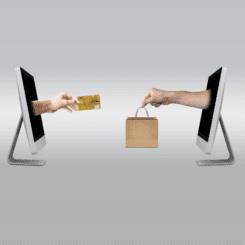
On a drive to visit my family, a billboard for a jeweler showed me a picture of a diamond ring with a speech bubble that said, “It’s time you told your boyfriend about me.”
“You didn’t think we’d forget, did you?” purred an ad I got from Victoria’s Secret during the month of my birthday, offering me $10 toward a gift for myself.
At the doctor’s office, a magazine ad for a credit card promised, “We’ll have you at ‘Hello.’”
I scoff at these sleazy marketing ploys. Who do these companies think they are, casting themselves as the equivalent of my significant other? They shower me with flattery, promise me special treatment, and assure me that my desires will be fulfilled.
When corporations present themselves to us like this, using the same language we generally reserve to speak about those we love, they imply that consumerism is an easy substitute for human relationships.
Yuck. I’ll take real people, thank you.
Except that I don’t always choose people over products. When I’m lonely, I often find myself turning to online shopping. Usually on my favorite fair trade websites, of course…and usually only when they have a good sale. So it’s not like I’m funneling loads of money into materialistic corporate America, right? Right?
I don’t always choose people over products.
The lure of acquiring something new—especially if I can convince myself that I’m really helping artisans in the developing world or the effort to save sea turtles—can be awfully satisfying. Purchasing something is one way to activate the brain’s reward system, releasing dopamine, a neurotransmitter chemical that is associated with enjoyable activities such as eating good food or a runner’s high. Shopping online is like eating candy for my brain. I am only a few clicks and a credit card number away from a nice little dose of dopamine—yay, new stuff! Even better if it was a good deal!
It’s quick and low-effort. Nothing is required except an internet connection and a willingness to wait for the package to arrive.
Somehow, I don’t always find myself turning to friends when I’m lonely, even though friendship—whether with people or with God—is the obvious remedy. Unlike shopping online, relating to others is rarely a quick or low-effort investment. True, the rewards of relationships are more satisfying and longer-lasting than the fleeting thrill of new purchases, but interacting with people is often demanding.
I’m an introvert. And also, I can be pretty lazy. Sometimes I want to feel better fast, and spending 20 minutes to call a friend and chat—not to mention listen to whatever unpleasant feelings she might be having herself—seems like too much work. Prayer also seems too labor-intensive to me, because of the mental focus it requires.
Friendships aren’t always restorative, of course. We all have friends whom we relegate to our outer circles because having them any closer to us would be irritating. And our closest friends sometimes go through periods when they need a lot of support from us, and we can’t always turn to them when we need refreshment. Even in our relationship with God, we may encounter “dry times,” when we simply don’t find much comfort in his presence.
But this doesn’t excuse us from doing the work that is necessary to live in relationship with others. Healthy community with God and others is the native soil in which, on the whole, we are meant to thrive. Buying new stuff will produce short-lived gratification, but not the lasting fulfillment we seek. We are meant to be community members, more than consumers. Friendships are central to our happiness and well-being in a way that material things are not.
We are meant to be community members, more than consumers.
Trying to fix my loneliness by buying something is about as helpful as trying to fix a stomach ache with a Band-Aid. Band-Aids are good for some ailments, but not that one. So I have to be attuned enough to my feelings to accurately diagnose the problem. When I’m really feeling down, sometimes it’s easier to just grab at whatever will dull the ache the fastest, rather than put in the work to analyze and address the underlying problem. Shopping is a momentary distraction from the pain of loneliness, but not a real solution.
Advertisements constantly reinforce the value of acquiring new things, but friendships rarely get the same media coverage (unless, of course, they’re being used to sell a product). But we don’t have to settle for faux relationships with material things. We can have real relationships with human beings instead.
So no thanks, corporate America. Your love is going to go unrequited. I want to see other people.
Allison Sheeler Duncan studied English and theology at Eastern University and is now a writer and editor at a university in southeast Pennsylvania. She writes about grace, beauty, and justice at her blog, Shining from Shook Foil, where a version of this piece first appeared. She enjoys growing flowers and heirloom tomatoes, watching superhero movies, and writing in calligraphy.



2 Responses
OUCH! The truth may set us free, but it’s so dang painful. Having just purchased two items on supersale through Ten Thousand Villages’ Fair Trade website — how’s that for the ultimate hypocritical irony — this article hurt more than usual. THANK YOU, Allison.
I relate to this on a visceral level. It’s like you know me. Thank you for this reminder and opening the conversation. Finding community is so difficult but worth it to nurture.